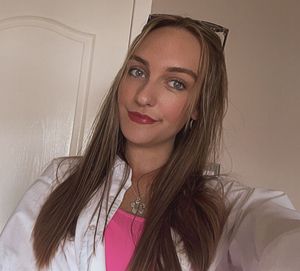38982966
Eyes 3 + 4
Description
No tags specified
Resource summary
Question 1
Question
The uveal tract includes which of the following?
Answer
-
ciliary body
-
choroid
-
iris
-
lens
-
retina
-
pupil
Question 2
Question
Which of the following symptoms would have a differential list of:
(conjunctivitis, ulceration, uveitis)
Answer
-
red eye
-
corneal oedema
-
miosis
-
hypotony
Question 3
Question
[blank_start]Panuveitis[blank_end]: there is subretinal fluid accumulation from inflamed choroid and can lead to retinal detachment and loss of vision.
Answer
-
Panuveitis
Question 4
Question
Uveitis in cats is associated in all of the below conditions but which ones should you test for?
Answer
-
FeLV
-
FIV
-
Toxoplasma
-
FIP
-
TB
-
Lymphoma
Question 5
Question
Glaucoma can be secondary to uveitis but which are the signs that are individual to Glaucoma only and are differentiating signs?
Answer
-
red eye
-
pain
-
corneal oedema
-
pupil enlarged
-
High IOP
-
Pupil constricted
-
low IOP
Question 6
Question
This is a .........
It is more common in ............
Need to differentiate from a ...............
Answer
-
uveal cyst
-
corneal laceration
-
glaucoma
-
pigmented dogs
-
female dogs
-
unneutered dogs
-
abscess
-
lens luxation
-
melanoma
Question 7
Question
What is true about melanomas in the eyes of cats and dogs?
Dogs: commonly [blank_start]benign[blank_end], involving the [blank_start]scalra[blank_end] and peripheral iris, eventually cause [blank_start]glaucoma[blank_end]
Cats: usually [blank_start]malignant[blank_end], should always remove, need to differentiate from [blank_start]iris naevi[blank_end], secondary glaucoma possible
Answer
-
benign
-
malignant
-
sclera
-
eyelids
-
lens
-
glaucoma
-
uveitis
-
cataract
-
iris naevi
-
uveal abscess
-
uveal cyst
-
squamous cell carcinomas
Question 8
Question
Primary glaucoma
- [blank_start]Inherited[blank_end]
- Closed primary glaucoma:
○ Defect in the [blank_start]drainage[blank_end] [blank_start]angle[blank_end] when it ends up being closed
○ Bilaterally but usually one first so act quick to save at least one eye
○ Many breeds effected.
- Open angle glaucoma
○ Terriers and bassets
○ Rarer
Lack of [blank_start]uveo-scleral[blank_end] [blank_start]outlfow[blank_end].
Answer
-
Inherited
-
drainage
-
angle
-
uveo-scleral
-
outlfow
Question 9
Question
Ø More subtle (like feline uveitis)
Ø Scleral congestion will be present
Ø Rarely primary ex Burmese.
Ø Corneal oedema is rare
Ø Don't show pain as much.
What is the above describing?
Answer
-
feline glaucoma
-
lens luxation
-
ocular proptosis
-
melanoma
Question 10
Question
Fill in the blanks for the treatment of different presentation of lens lauxation
If behind pupil = [blank_start]prostaglandin[blank_end] [blank_start]analogues[blank_end]
If full luxated through pupil = [blank_start]surgical[blank_end] [blank_start]removal[blank_end] or return to the posterior chamber.
Need to treat secondary [blank_start]glaucoma[blank_end].
Answer
-
prostaglandin
-
analogues
-
surgical
-
removal
-
glaucoma
Question 11
Question
Causes of proptosis:
- [blank_start]Retrobulbar abscess[blank_end]- younger dogs, acute, painful opening mouth adn may see on US.
- [blank_start]Retrobulbar neoplasia[blank_end]- older dog, only usually painful if infected.
[blank_start]Masticatory myositis[blank_end] - young dog, acute, all masticatory muscles and often bilateral.
Answer
-
Retrobulbar abscess
-
Retrobulbar neoplasia
-
Masticatory myositis
-
uveal cyst
-
uveal abscess
-
cerebral oedema
Question 12
Question
This is .............
It occurs as the ......... densely pack the ..........
Vision is/is not greatly affected
Answer
-
nuclear sclerosis
-
zonules
-
lens
-
is not
Question 13
Question
○ [blank_start]Incipient[blank_end] <15% lens volume
○ [blank_start]Immature[blank_end] >15% but less than 100%
○ [blank_start]Mature[blank_end] = 100% of the lens volume and there is loss of retinal reflex (PLR) and menance.
[blank_start]Hypermature[blank_end] = opacity shrink and lens fibres resorbed.
Answer
-
Incipient
-
Immature
-
Mature
-
Hypermature
Question 14
Question
Which of the following causes of cataracts can cause sudden progression of them and may present with acute onset blindness?
Answer
-
diabetic
-
inherited
-
post-uveitis
-
trauma
-
radiation
-
secondary to retinal detachment
Question 15
Question
What animal's retina is this?
What are the anatomical structures?
Answer
-
optic nerve
-
Dog
-
retinal venules
-
retinal arterioles
Question 16
Question
T/F: the colour of the retina in the dog is generally similar after they become adults?
Answer
- True
- False
Question 17
Question
Which of the following causes increased tapetum reflectivity and decreased tapetum reflectivity respectively?
Answer
-
inflammation atrophy
-
oedema inflammation
-
atrophy inflammation
-
oedema atrophy
Question 18
Question
Match the causes of retinal atrophy with the facts about them
Inflammation- can be hard to differentiate from [blank_start]chorio-retinitis[blank_end]
Collie eye abnormality - [blank_start]non-progressive[blank_end], blindness in pups, [blank_start]coloboma and retinal detachment.[blank_end]
Progressive retinal atrophy - many breeds, can cause [blank_start]cataracts[blank_end], [blank_start]gradual[blank_end] degeneration
Answer
-
non-progressive
-
coloboma and retinal detachment.
-
cataracts
-
gradual
-
sudden
-
chorio-retinitis
-
uveitis
-
uveal abscesses
Question 19
Question
Which is a better prognosis for retinal detachment?
Answer
-
serous
-
haemorrhagic
Question 20
Question
Hypertension is a common cause of [blank_start]retinal[blank_end] [blank_start]detachment[blank_end] in cats, associated with renal disease, [blank_start]hyperthyroidism[blank_end] and Conns dx
>[blank_start]160[blank_end]mmHg
Do NOT [blank_start]take bloods[blank_end] if the cat has uncontrolled hypertension
Answer
-
take bloods
-
hyperthyroidism
-
160
-
retinal
-
detachment
Question 21
Question
T/F: exceeding 5mg/kg of enrofloxacin in cats will cause irreversible retinal detachment hence blindness.
Answer
- True
- False
Want to create your own Quizzes for free with GoConqr? Learn more.

